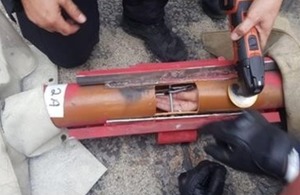Government cracking down on highly disruptive protest tactics
An amendment to the PCSC Bill would give the police the power to stop and search people to seize items intended to cause serious disruption by ‘locking-on’.

Protester's arm taped to floor being carefully removed by police.
Crucial new powers to prevent the significant disruption caused by protesters determined to lock or glue themselves onto structures will be brought back to Parliament this week.
An amendment to the Police, Crime, Sentencing and Courts Bill will be re-tabled on Wednesday 1 December which would give the police the power to stop and search people in order to seize items intended to cause serious disruption by ‘locking-on’ – where there is reasonable suspicion. This could include equipment such as chains, glue and bamboo scaffolding structures.
The measure has been informed by the experiences of policing in response to the deployment of lock-ons in protest. Use of this disruptive and dangerous tactic has risen in recent years – including on some of the UK’s busiest and most dangerous motorways.
It has led to massive disruption on major roads in and around the capital, preventing people from getting to work or crucial hospital appointments, also resulting in a significant drain on police resources, due to the time it takes to remove complex lock-ons safely.
In support of the government’s proposals to stop and search for lock-on equipment where there is reasonable suspicion, Metropolitan Police Service Deputy Commissioner, Sir Steve House, said:
Public Order policing is one of the most challenging aspects of modern-day policing. Public order events often present unique challenges and complexity. Officers and command teams have to balance the rights of everyone involved, including local communities, when considering how to respond.
The government’s proposed amendments to the Police, Crime, Sentencing and Courts Bill will support the policing response to the deployment of lock-ons in protests. The increased use of lock-ons by certain protest groups has added to the challenging nature of public order policing and created significant disruption to the public over recent years.
We have seen individuals lock themselves to the drive shafts of vehicles, locked together in tubes encased in concrete, locked onto structures at height, and glued to roads. Removing these lock-ons safely requires specialist policing teams to be deployed to what can be high risk environments, taking time and significant resources. This is time that our officers are taken away from policing their local communities and local policing priorities.
It is ultimately for Parliament to decide whether the new powers proposed by the Home Office should be enacted and we know that these decisions are rightly ones where the challenges facing policing are just one of many considerations which politicians need to consider.
Home Secretary Priti Patel said:
The police have our full support to maintain the pace at which they deal with difficult protests and public order matters. We have seen some of the most self-defeating and dangerous protests ever seen in recent years with people gluing themselves to roads and locking themselves to vehicles and buildings, causing serious disruption to the law-abiding majority across the country.
These are selfish actions which drain the police of resources which should be used in our communities, protecting the vulnerable people who need them most. This government will always back the police. That’s why our Police, Crime, Sentencing and Courts Bill is so necessary, and the public expects everyone in Parliament to deter this kind of disruption by supporting this Bill.
The government also intends to make the act of locking-on to cause serious disruption a criminal offence, which could see someone jailed for up to six months and faced with an unlimited fine.
Another government amendment will mean that blocking a motorway would meet the same punishment. The current law for this offence sets the penalty at a maximum fine of just £1,000 and is not an adequate deterrent for organisations determined to cause widespread disruption and break the law.
And Serious Disruption Prevention Orders will be brought in to tackle protesters who are determined to repeatedly cause disruption to the public. These will give the courts the power to impose orders on those with protest related convictions or a history of causing serious disruptions at protests in order to prevent them from continuing to commit such acts.